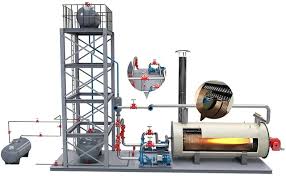
Apr . 19, 2024 17:11 Back to list
The benefits of an oil boiler
The benefits of an oil boiler
Did you know that in the UK there is an estimated 4 million households not connected to a mains gas supply? These properties are all powered using oil central heating systems as an alternative.
Oil central heating systems work in a very similar way to traditional gas-powered systems; however, they simply use an oil-fired boiler to provide heat and hot water. It is also worth noting that oil boilers are one of the most cost-effective methods of fuelling a central heating system, although the price of fuel can fluctuate.
An oil boiler isn’t a suitable option for every home, but for many it is a great option. So, what are the advantages of an oil boiler?
- Oil boiler are extremely energy efficient as they only heat water on demand rather than having a stored backlog. Not only does that reduce energy output but it saves on the amount of fuel required.
- Running costs of an oil-fired boiler are typically significantly lower than electric boilers. Plus, oil is a more efficient fuel than gas, so it gives a good return on every unit of energy.
-
Coal fired thermal Oil Boiler

- Ideal alternative for households that do not have access to a mains gas supply
- Oil boilers provide the homeowner the freedom to change supplier at any time as there are not contracts in place with a mains gas supplier.
- Oil-fired boilers can be used alongside renewable energy heaters providing flexibility in how homeowners choose to heat their properties.
- Typically, a new oil-fired boiler will have an efficiency of 92-95%, compared to 60-70% in the case of older systems.
How do oil boilers work
Oil boilers functionally operate in the same way as any other boiler, the oil is set alight, and a heat exchanger warms up cold water from either your mains pipe or a storage tank. The boiler then pumps the hot water through radiators within your central heating system or to your taps when hot water is required.
Operationally the big difference with oil boiler and other fuel types is that an oil fired boiler requires an external oil supply. An external storage tank holds this oil securely and requires a regular delivery once you understand how much oil your property needs for heating and hot water.
There are 3 different types of oil boilers, combi, conventional and system boilers, allowing you to select the most appropriate option for your property. Oil combi boilers have their own hot water storage tank built in, as opposed to the external components required for the conventional and system boilers.
-
Types of coal fired steam boiler: Efficient & Low Emissions
NewsNov.17,2025
-
Types of Coal Fired Steam Boiler | Efficient & Reliable
NewsNov.17,2025
-
Reliable Steam Boiler Supplier for Industrial Solutions
NewsNov.17,2025
-
Coal Fired Hot Water Boiler | High Efficiency & Durable
NewsNov.17,2025
-
Reliable Industrial Steam Boiler Manufacturers for Efficient Operations
NewsNov.17,2025
-
Commercial Steam Boilers for Sale - Efficient, Gas & Oil
NewsNov.17,2025
Related PRODUCTS






















